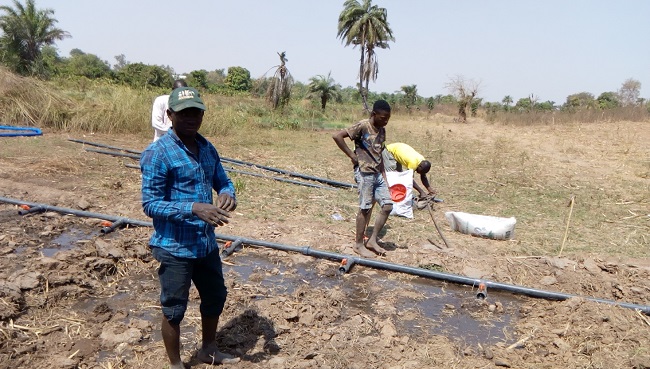Ayuba Abimiku, a young rice farmer at Gidan Mai-Akuya community in Nasarawa State, North-central Nigeria, is excited.

Ayuba is witnessing the operation of a pressured plastic-piped sprinkler for the first time.
“This system allows for proper water management and the farmer can determine the right amount of water needed in the field per time,” he enthused.
“With this, less water is required, unlike the old method which often floods our farms,” he said.
“This technology has made dry season rice farming attractive to the youths, who hitherto do not want to get themselves dirty,” Godiya Ovey, from Madagba community, said.
“This is a system that does not require much effort once you know how to set it up. You can combine it with other endeavours,” he added.
Moses Tsaku, another youth farmer from Azuba-Bashayi community, says the pressured sprinkler and the wet and drying scheduling irrigation technologies have made dry season farming a lot easier.
“These technologies have completely changed my perception about farming,” Moses declared excitedly.
These declarations were made by these young farmers during a visit to demonstration farms in three communities in Lafia Local Government Area of Nasarawa State.
They were among the farmers that were previously trained and exposed to the new irrigation technologies on rice production under the Water Enabler Compact (TAAT–WEC) of the Technologies for African Agricultural Transformation (TAAT) programme.
Sponsored by the African Development Bank as part of its Feed Africa Initiative, TAAT’s main objective is to improve the business of agriculture across Africa by raising agricultural productivity, mitigating risks and promoting diversification and processing in 18 agricultural value chains within eight priority intervention areas.
The programme increases agricultural productivity through the deployment of proven and high-performance agricultural technologies at scale along selected nine commodity value chains. These work with six enabler compacts addressing transversal issues such as soil fertility management, water management, capacity development, policy support, attracting African youth in agribusiness and fall armyworm response.
The TAAT Water Compact is led by the International Water Management Institute (IWMI) and implemented in Nigeria through the Institute of Agricultural Research (IAR) at the Ahmadu Bello University, Zaria.
The compact promotes low-cost and easy-to-deploy irrigation and water management technologies to small-scale farmers across Africa.
Prof. Henry Igbadun, who coordinates the compact in Nigeria, said that the project in Nasarawa State began in 2019 with the training of 40 youths and agriculture extension workers on the new irrigation technologies.
According to him, the farmers were trained and introduced to the technologies with field demonstration where the farmers, in groups of 10, applied the technologies in rice production from nursery, transplanting and to near harvest.
With sights on water management for increased rice production, “the project is aimed at building the capacity of a cadre of trainers, including innovation platform facilitators, extension agents, champion farmers and youths in the proper use of irrigation and water management technologies as well as implementation of good irrigation management practice,” Igbadun said.
Mr Jonathan Joshua, who chairs the Bukan-sidi rice innovation platform established by the African Development Bank (AfDB) sponsored SARD-SC project in Nasarawa State, lauded the TAAT–WEC initiative, saying it has engendered youth interest in agriculture.
He encouraged other farmers to consider going into dry season farming using the technology and not rely only on rain-fed farming for rice production.
“This is the only way we can ensure food sufficiency, especially with the looming food shortage occasioned by the COVID-19 pandemic,” Joshua added.
The farmers, who are mainly youths, appealed to the Nigerian government and stakeholders to join efforts with the TAAT programme in scaling up these new irrigation technologies with a view to boosting dry season rice production in order to avert hunger after the coronavirus (COVID-19) pandemic.
This, they believe, will ensure an all year-round rice production and sufficiency after the coronavirus pandemic.
